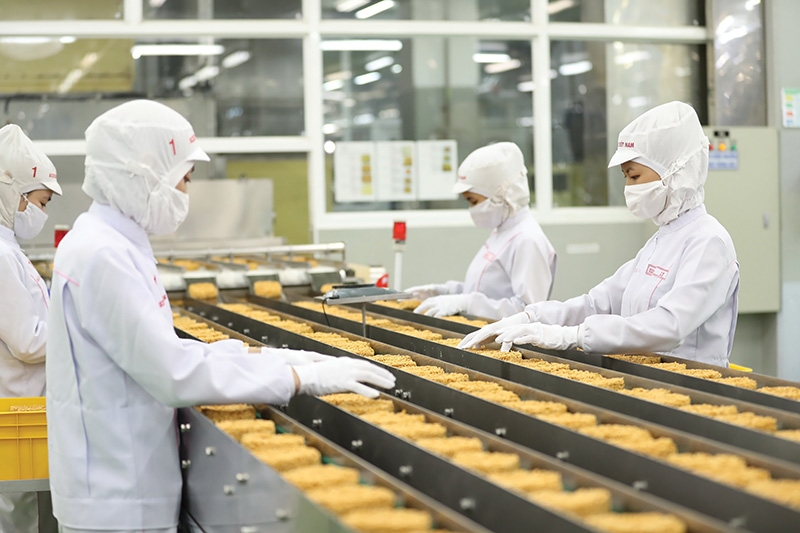Instant noodle groups strive to get supply out
 |
| Products are finding it harder to reach points of sale due to current travel restrictions. Photo: Le Toan |
Acecook, the most well-known instant noodle brand in Vietnam, is feeling the impact of the lack of raw materials and labour. The company is now focusing on producing and supplying some of its key products only. A large proportion of its instant noodles are now supplied to supermarkets amidst the closures of several traditional markets.
Acecook general director Kajiwara Junichi told VIR, “Some of our transport partners suffered from COVID-19 cases, which resulted in a shortage of trucks to transport goods. This not only affects our delivery to distributors and supermarkets but also the transshipment of finished products between branches.”
“In the context of the current pandemic, instant noodles have become an extremely convenient and essential food for consumers, leading to the increased consumer demand,” Junichi said. “However, the pandemic is also disrupting many aspects of the supply chain such as reducing production output at factories as well as making it difficult to import raw materials and transport goods. This is an unprecedented crisis for Acecook but we are doing our best to maintain supplies to consumers.”
Likewise, Uniben, the owner of Reeva and 3 Mien instant noodle brands, also face difficulties in transporting goods during social distancing directives. General director Vu Tien Dung revealed, “Uniben is struggling in supplying goods to supermarkets and points of sale in Ho Chi Minh City. There are not enough trucks and delivery personnel as drivers moving from pandemic areas must commit to a 14-day self-quarantine.”
Meanwhile, the implementation of Directive No.16/CT-TTg together with strengthened control measures mean deliveries are not as simple as before. As Dung told VIR, the approval of QR code registration for transport can be complicated and take time. Plus, drivers must regularly have a PCR COVID-19 test, but there is no agreement on the regulations for the PCR result on each road checkpoint.
Interruption in the supply chain also raises objections. Uniben’s production has not remained stable as it lacks input material.
“Due to this shortage, not many items are produced. Therefore, the number of products distributed to supermarkets and points of sale has dropped against compared to before restrictions were put in place,” Dung added.
Elsewhere, one enterprise that makes seasoning sachets for instant noodle packs has been suspended for 14 days due to a positive COVID-19 case. This enterprise usually supplies nearly 450 tonnes of sachets for instant noodle makers a month.
Ly Kim Chi, chairman of the Food and Foodstuff Association of Ho Chi Minh City, said that all the raw materials of the food processing industry from neighbouring provinces have flocked to city, which is now under the tightened Directive 16. The transport gridlock has resulted in a shortage of raw materials and instant noodles in the market.
To ensure the production progress, noodle producers in southern cities and provinces are applying the “three-on-the-spot” model for all employees to live, stay, and eat on site. The factories fully implement anti-pandemic measures to maintain production.
“Acecook continues to maintain operations under this model. Although it causes challenges, in the long run we are trying to find solutions to take care of employees mentally and physically. At the same time, we are also thinking about a more optimal solution,” Junichi stated.
At the factories of Uniben in the southern province of Binh Duong, employees were tested for COVID-19 on the first day of three-on-the-spot implementation and once every seven days. Moreover, the company also disinfects all work areas and divides meals into time frames to avoid large gatherings.
According to Chi, some food companies under this model can only use 50 per cent of the workforce – not enough for production, leading to a reduction in the number of finished products. Moreover, 70 per cent of businesses in the food industry are selling to cover losses and break even. The pandemic is rubbing salt in the wound when they are dealing with a shortage of input materials and rising costs of on-site production.
Bui Mai Phuong, chairwoman of the Board of Directors at Vietnam Food Industries JSC (Vifon) said, “We have to cut the number of workers from 1,300 to nearly 500 to maintain the production plan, which has resulted in a large slump in instant noodle output. This affects our domestic supplies and hinders our exports. If we fail to deliver products to foreign buyers as scheduled, we will have to pay compensation and even lose our export markets.”
Acecook and Vifon currently produce four billion packages of instant noodles per year. According to the World Instant Noodles Association, Vietnam was the third-largest instant noodles consumer in the world in 2020 with 7.03 billion servings, trailing behind China and Indonesia.
What the stars mean:
★ Poor ★ ★ Promising ★★★ Good ★★★★ Very good ★★★★★ Exceptional
 Tag:
Tag:
Related Contents
Latest News
More News
- Hermes joins Long Thanh cargo terminal development (February 04, 2026 | 15:59)
- SCG enhances production and distribution in Vietnam (February 04, 2026 | 08:00)
- UNIVACCO strengthens Asia expansion with Vietnam facility (February 03, 2026 | 08:00)
- Cai Mep Ha Port project wins approval with $1.95bn investment (February 02, 2026 | 16:17)
- Repositioning Vietnam in Asia’s manufacturing race (February 02, 2026 | 16:00)
- Manufacturing growth remains solid in early 2026 (February 02, 2026 | 15:28)
- Navigating venture capital trends across the continent (February 02, 2026 | 14:00)
- Motivations to achieve high growth (February 02, 2026 | 11:00)
- Capacity and regulations among British areas of expertise in IFCs (February 02, 2026 | 09:09)
- Transition underway in German investment across Vietnam (February 02, 2026 | 08:00)






















 Mobile Version
Mobile Version